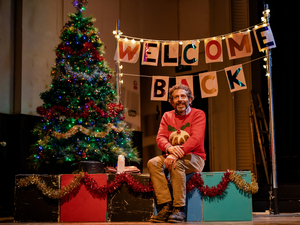Review: SNOWFLAKE, Kiln Theatre

![]()
It's Christmas Eve and Andy (Elliot Levey) is waiting for his daughter Maya (Ellen Robertson) to come back to him. She left home three years prior after they had - according to her father - a silly argument and she hasn't spoken to him since, nor has she replied to his texts. But someone has seen her in a café in Oxford, so Andy feels that she's ready to finally meet him. He's decked the village hall (beautifully designed by Jeremy Herbert - the frost on the high windows is the cherry on top) to welcome her back and he's sure she's coming, even though there are no signs of her. Then, Natalie (Amber James) bursts through the door.
Mike Bartlett's seasonal play made its debut last year in his native city and has now been updated and revamped slightly for its run at the Kiln. Clare Lizzimore directs the festive and heavily political piece that shakily tries to sit in No-man's-land between its two sides. Bartlett's energetic writing and Lizzimore's finely tuned direction push Levey to deliver a sincere and deeply emotional performance.
The first act sees an erratic and very human stream of consciousness where Levey is preparing to meet Maya. As he's meticulously planning the encounter, he is bouncy and hyper, concealing his insecurities with his sturdy and uncompromising pride. His act-long speech has him starting his process of victimisation which will explode in the second part, and sets up his character as a rather stereotypical middle-aged white man who considers the good ol' days as the peak of humankind.
While the audience is led to get to this lovely and hurt man's side in the first lenghty scene, Natalie's arrival becomes the earthquake that flips the tables and reveals the actual subject of Bartlett's work. The generational clash is immediately evident. James is cool and collected, attentive and smart in the perfect picture of a woke millennial. Passionate about politics, she hides her game well but challenges his beliefs in a battle of points of view.
James's Natalie is bluntly confrontational but a clever listener as she offers an emotionally savvy portrayal throughout. Their exchanges mark a glorious fluctuation of energy and build an initially innocuous chance meeting into a compelling (yet, at this point, rather trite) discussion on Brexit. James's quips and rebukes edge Levey towards an explosion of classical Gen X blind rage, which marks the sophisticated climax of his performance.
Maya's sudden appearance stops Andy in his tracks, and he's forced to reevaluate his position once again. Robertson's entrance is statuesque, immovable and intransigent in the motives that brought her character to Oxford. Where James is openly passionate, her stand is more reserved and suspicious, but the inflexibility and morale of her portrait is the final brick of Bartlett's comparison.
The playwright presents two factions coming together. Their flaws are open wounds, and the image is a familiar one too a lot of people. Andy's exemplar middle-aged tirade and patronising attitude towards his younger counterparts meets a wall, just like their discourse does. Snowflake is an intentionally equivocal play. The newer generations will find Andy unnerving and short-sighted, the older ones will shut the young women down easily as they mostly do in real life.
It's interesting to see how Bartlett keeps their political stance strong throughout. None of them budges or even attempts to understand the opposition, but the writer highlights the difference in approach: Andy's dismissive remarks and constant interruptions are called out throughout the second act, while Natalie and Maya's calm but piercing rebukes are stressed with Lizzimore's use of the actors' body language.
The political and personal background of the trio engages in an equal tennis match after the intermission, but the lengthy spotlight that had just been placed on Andy's character before tips the balance characterisation-wise. Levey's had the time and scope to build up his character and his stance in front of the audience, while his daughter and Natalie have to rely on their common sense and their impartiality to have the same grip.
Maya begs her father to listen to her instead of interrupting her invariably, a precise reflection on everyday life. That's what Snowflake ultimately is: the piece is an open letter to all sides of an argument that has destroyed families and friend groups. It doesn't give any answers by trying to maintain its neutrality (even though, as said, it marginally fails in this by giving so much breath to Andy's internal monologue - which might, obviously, still not represent the writer's personal view).
In this case, the family are able to set those same politics that once divided them to the side for the greater good, but one wonders if that could actually happen off stage. Since it's Christmas after all, we'll decide that it could. And they lived happily ever after in a broken Britain.
Snowflake runs at the Kiln Theatre until 25 January.
Image courtesy of Manuel Harlan
Reader Reviews
Videos

